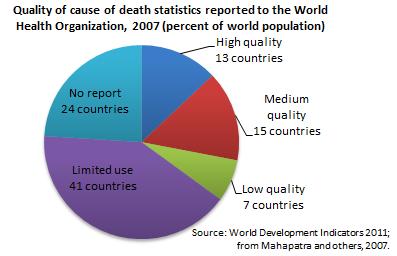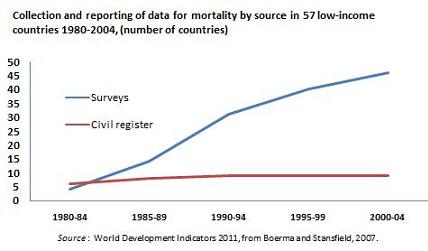With just four years to the target date of 2015, progress on the health-related Millennium Development Goals (MDGs) has been slow. Measuring progress has been hampered by 
Why has it been so difficult to make credible progress on the health-related, goals? It is not of course solely because of a lack of data; but knowing what causes death is surely a necessary condition to guide policies, priorities, and programs to reduce them. In high income countries, this information is routinely available from death registration records, which are part of the civil registration systems of countries. Around half of the world’s population live in countries where causes of death are only partially recorded and are of limited use , or where deaths are not recorded at all. Correct reporting of cause of death is particularly difficult in developing countries where many deaths occur at home without medical care or certification.

Civil registration (CR) has a civil role; but it is also an integral part of a good statistical system, along with censuses and surveys and other administrative records. CR provides legal documentation to protect citizenship, property, and other economic, social and human rights. But it also provides regular, frequent, and timely information on the dynamics of population growth, size, and distribution, and a record of births and deaths by age, sex, and cause of death. These statistics are essential for planning basic social services and infrastructure development, and for understanding and monitoring health issues. Once in place, data from civil registration systems cost less to collect than conducting a census or survey. Also, these data are based on a record of events rather than on an individual’s recollection of those events.

Despite its impact on development, CR is yet to take roots in developing countries. Implementing good CR systems is not easy; it requires political commitment, a supportive legal framework, mobilization of financial and human resources, and, critically, the trust of its citizens. As a result, many countries have opted to adopt interim approaches to measure and monitor vital events and related socio-demographic information. As dependence on these measures grows, national authorities have fewer incentives to invest in complete CR systems.
Given the importance of CR to measure and monitor development and welfare outcomes, there is an urgency to implement these systems in developing countries. The Statistics Division of the United Nations has recognized this, and is leading work in this area with its partners. What more can be done?
For a more detailed discussion on civil registration systems and their role in measuring and monitoring development progress, see Chapter 2 of the 2011 World Development Indicators – released on April 14th, and available free in electronic formats.
Visit: http://data.worldbank.org.


Join the Conversation